Module 10 Spring Festival 模块导学课件
文档属性
| 名称 | Module 10 Spring Festival 模块导学课件 | 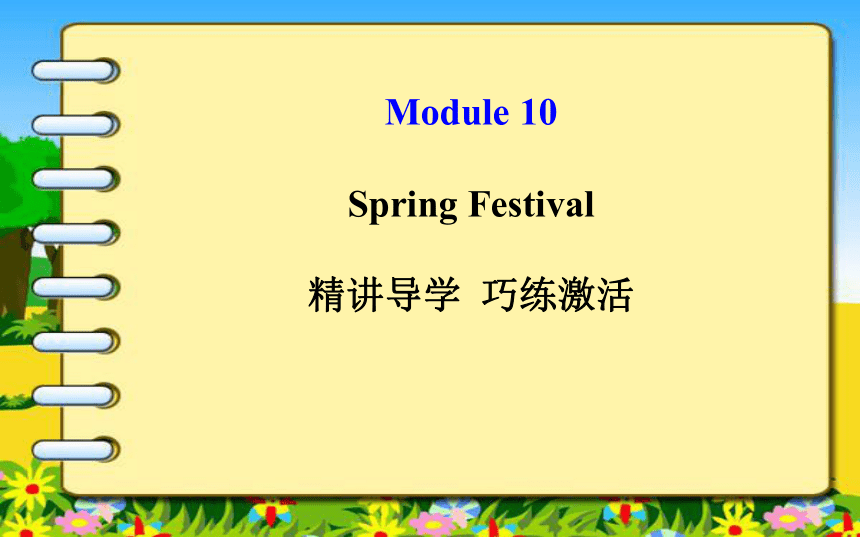 | |
| 格式 | zip | ||
| 文件大小 | 3.2MB | ||
| 资源类型 | 教案 | ||
| 版本资源 | 外研版 | ||
| 科目 | 英语 | ||
| 更新时间 | 2014-11-21 00:34:10 | ||
图片预览

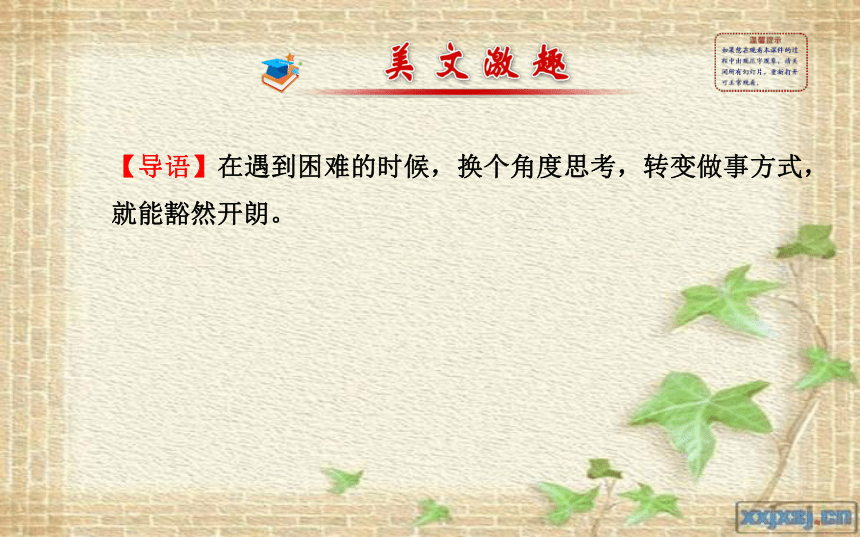
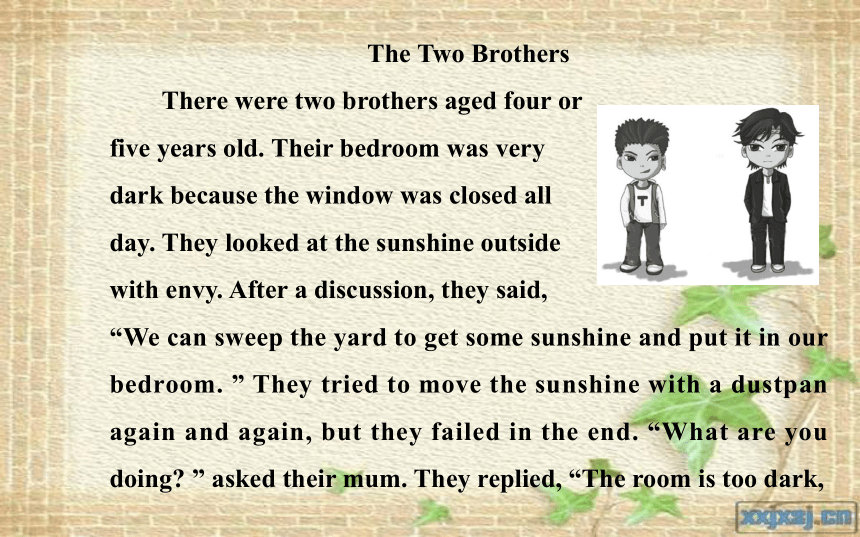
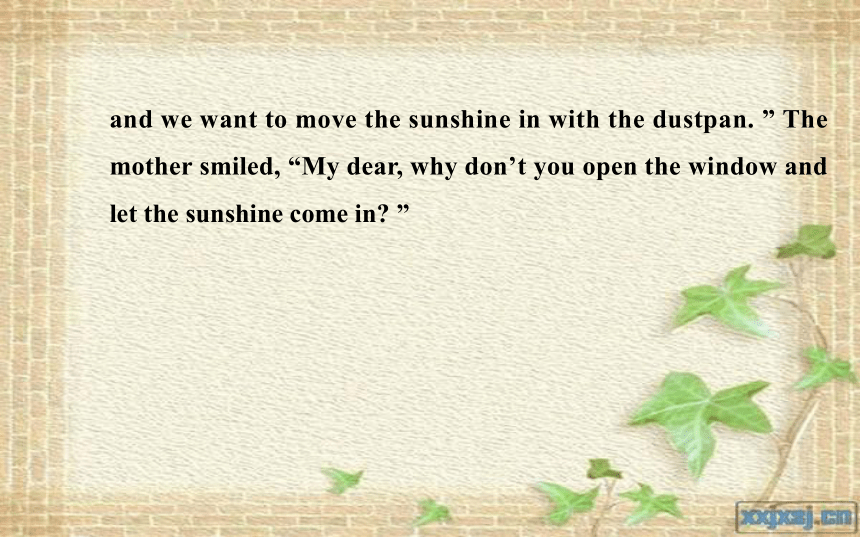
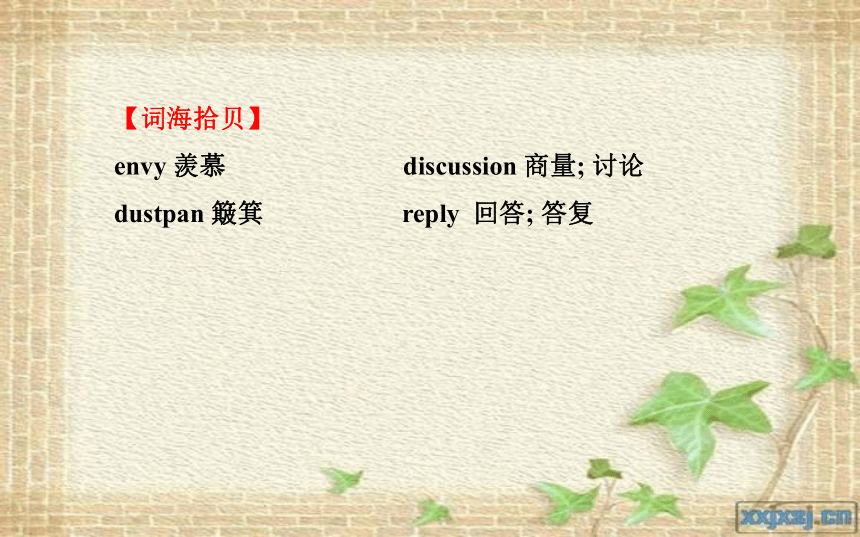
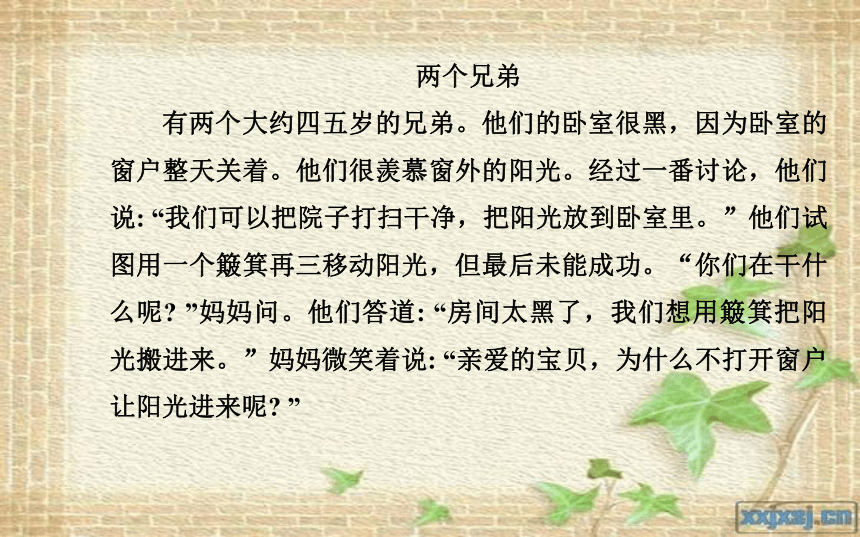
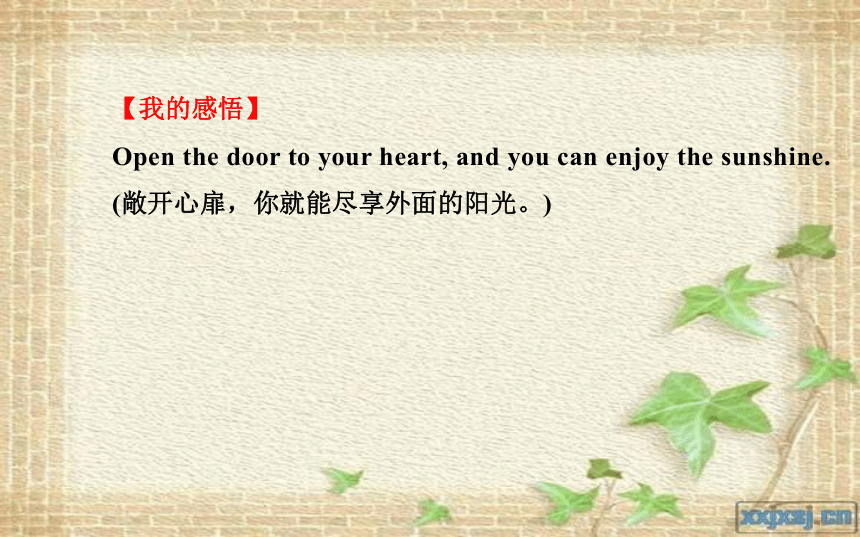
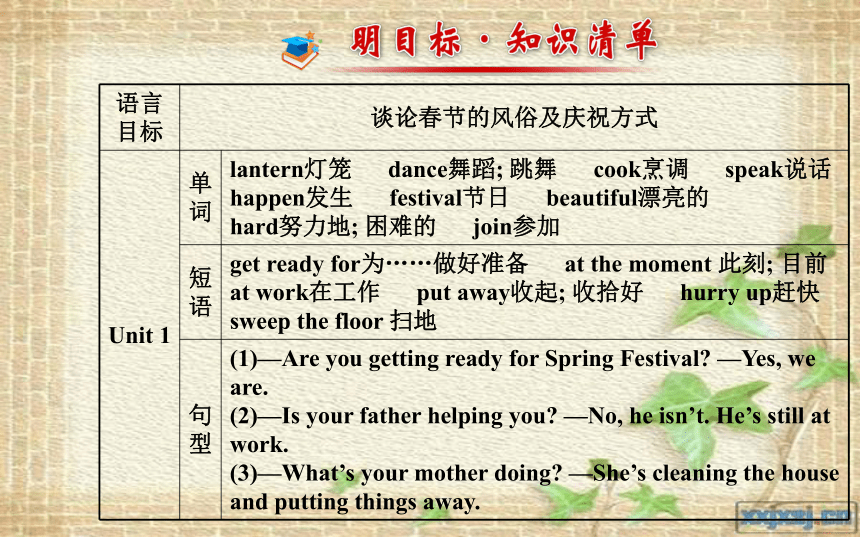
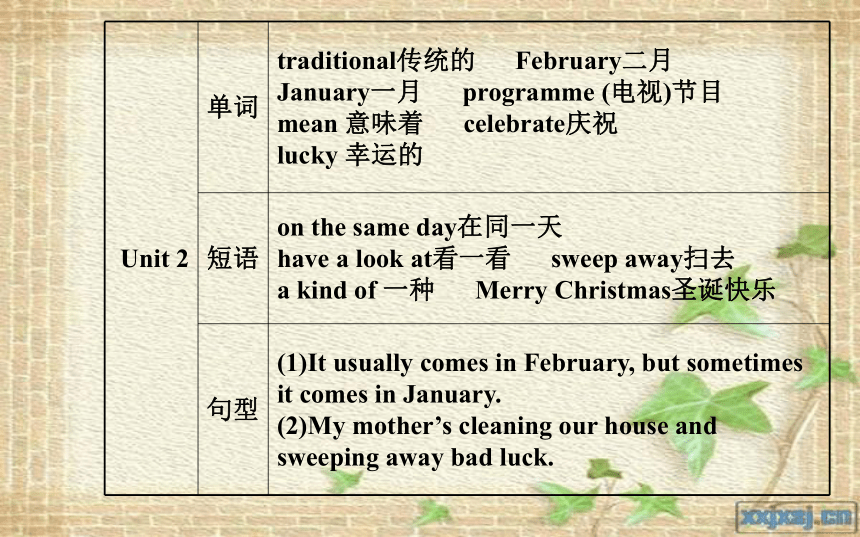
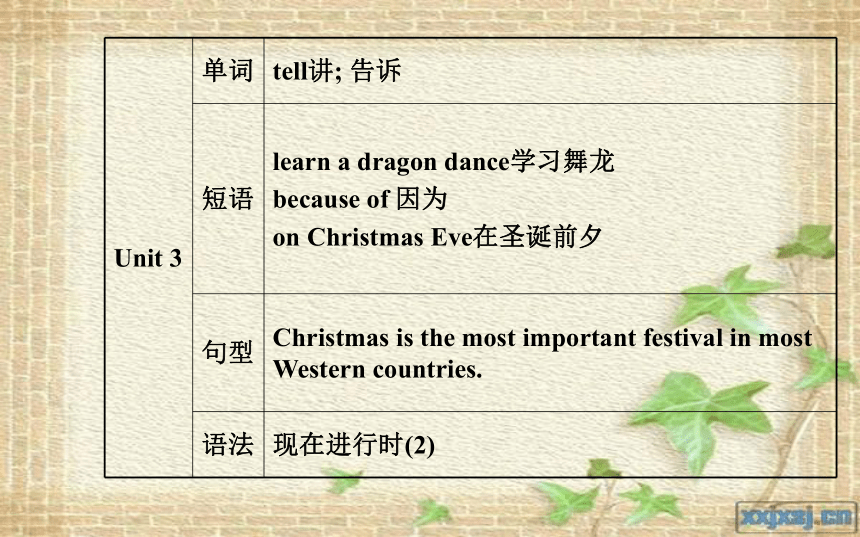
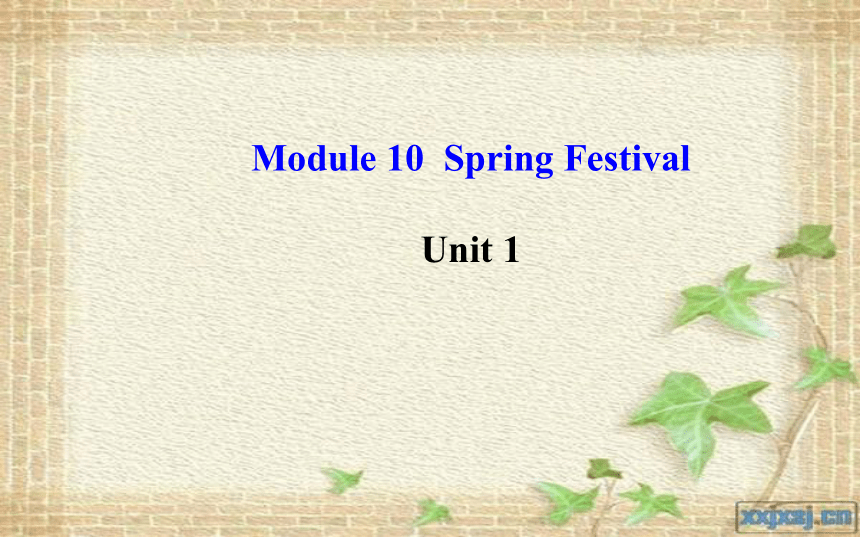
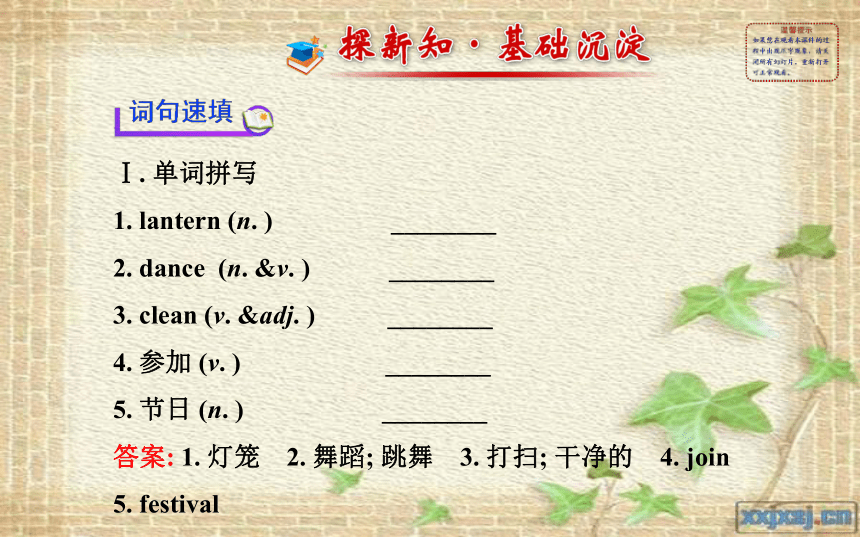
文档简介
课件89张PPT。Module 10
Spring Festival
精讲导学 巧练激活【导语】在遇到困难的时候,换个角度思考,转变做事方式,就能豁然开朗。 The Two Brothers
There were two brothers aged four or
five years old. Their bedroom was very
dark because the window was closed all
day. They looked at the sunshine outside
with envy. After a discussion, they said,
“We can sweep the yard to get some sunshine and put it in our bedroom. ” They tried to move the sunshine with a dustpan again and again, but they failed in the end. “What are you doing? ” asked their mum. They replied, “The room is too dark, and we want to move the sunshine in with the dustpan. ” The mother smiled, “My dear, why don’t you open the window and let the sunshine come in? ”【词海拾贝】
envy 羡慕 discussion 商量; 讨论
dustpan 簸箕 reply 回答; 答复两个兄弟
有两个大约四五岁的兄弟。他们的卧室很黑,因为卧室的窗户整天关着。他们很羡慕窗外的阳光。经过一番讨论,他们说: “我们可以把院子打扫干净,把阳光放到卧室里。”他们试图用一个簸箕再三移动阳光,但最后未能成功。“你们在干什么呢? ”妈妈问。他们答道: “房间太黑了,我们想用簸箕把阳光搬进来。”妈妈微笑着说: “亲爱的宝贝,为什么不打开窗户让阳光进来呢? ”【我的感悟】
Open the door to your heart, and you can enjoy the sunshine. (敞开心扉,你就能尽享外面的阳光。)Module 10 Spring Festival
Unit 1 Ⅰ. 单词拼写
1. lantern (n. ) ________
2. dance (n. &v. ) ________
3. clean (v. &adj. ) ________
4. 参加 (v. ) ________
5. 节日 (n. ) ________
答案: 1. 灯笼 2. 舞蹈; 跳舞 3. 打扫; 干净的 4. join
5. festival6. 努力地; 困难的 (adv. &adj. ) ________
7. 发生 (v. ) ________
8. beauty (n. )→________(adj. )漂亮的
答案: 6. hard 7. happen 8. beautiful Ⅱ. 短语连线
1. get ready for A. 此刻; 目前
2. at the moment B. 赶快
3. put away C. 扫地
4. hurry up D. 收起; 收拾好
5. sweep the floor E. 为……做好准备Ⅲ. 句型填词
1. 发生什么事了?
________ ________?
2. ——你们在为春节做准备吗?
——是的。
— ________ you ________ ready for Spring Festival?
—Yes, we ________.
答案: 1. What’s happening 2. Are; getting; are 3. ——你的爸爸在帮助你吗?
——不,没有。他还在工作。
— ________your father ________you?
—No, he ________. He’s still ________ ________.
4. ——你妈妈在做什么?
——她在打扫房间,收拾东西。
—What ________ your mother________?
—She’s cleaning the house and ________ things away.
答案: 3. Is; helping; isn’t; at work 4. is; doing; putting5. ——大明和贝蒂在做什么?
——他们在跟我爷爷学舞龙。
— ________are Daming and Betty ________?
—They’re ________a dragon dance ________ my grandpa.
答案: What; doing; learning; with1. He cleans his room every day.
He is cleaning his room now.
_________________________________
_________________________________
答案: 第一句是一般现在时; 第二句是现在进行时。 2. ①We are playing football.
②They are visiting China.
____________________________________________
____________________________________________
答案: (1)What are you doing? (2)What are they doing? 1. happen v. 发生
【语境领悟】
*What’s happening?
发生什么事了?
*What’s happening to Tony?
托尼发生什么事了?
*I happen to meet my old friend, Jimmy.
我碰巧遇到了我的老朋友,吉米。【自主归纳】
happen意为“发生”,作动词,多指偶然发生或未经安排而发生,常用结构为:
(1)“某地(某时)发生了什么事”常用“sth. +happen(s)/happened+地点+时间”结构。
(2)“某人出了某事”要用“sth. happen(s)/happened to sb. ”。
(3)“某人碰巧做某事”用“sb. happen(s)/happened to do sth. ”。 【温馨提示】
What’s happening? 意为“在忙什么? ”“怎么啦? ”“发生了什么事? ”,相当于What’s wrong? /What’s the trouble? /What’s the matter? 【学以致用】
①外面正在发生什么事?
________ ________ outside?
②Mary happens ________ (see) him on her way to school.
答案: ①What’s happening ②to see2. ready adj. 有准备的; 准备好的
【语境领悟】
*Are you getting ready for Spring Festival?
你们正在为春节做准备吗?
*They are getting ready for making lanterns.
他们正在为制作灯笼做准备。
*Do you get lunch ready?
你把午饭准备好了吗?
*We get ready to go on a picnic.
我们准备好去野餐。【自主归纳】
ready作形容词,意为“准备好的”,常用于固定搭配:
(1)get sth. ready 意为“把某物/某事准备好”。
(2)get ready for 意为“为……做准备”, 其中for为介词, 后接名词或v. -ing形式。
(3)get ready to do sth. 意为“准备做某事”。【学以致用】
①My mother usually gets up early and gets ready ______ the meal.
A. for cook B. cook C. cooking D. to cook
②We are getting ready for ______ (learn) a dragon dance.
答案: learning3. join v. 参加; 加入
【语境领悟】
*Can I join them? 我能加入他们吗?
*It’s everyone’s duty to join the Clean Your Plate Campaign.
我们每个人都有责任加入“光盘行动”。
*Can I join in the guessing game?
我能加入竞猜游戏吗? 【自主归纳】 “加入”不同【学以致用】
他加入了一个英语俱乐部来提高英语。
He ________ ________ ________ ________ to improve his English.
答案: joins an English clubⅠ. 从方框中选词并用其适当形式填空
meal, join, festival,beautiful,sweep
1. I often help my mum ______ the floor.
2. We have three ______ every day.
3. Miss Green is very ______ and kind. We all like her very much.
4. —We want to go swimming. Would you like to ______ us?
—Of course.
5. In China, we know there are many important ______.
答案: 1. sweep 2. meals 3. beautiful 4. join 5. festivalsⅡ. 完成句子
1. 刘飞正在为运动会做准备。
Liu Fei is ______ ______ ______ the sports meeting.
2. 你的书到处都是。把它们收起来。
Your books are everywhere. ______ ______ ______.
3. 那边发生了什么事? 我们赶快去看看!
______ ______ over there? Let’s ______ ______ and see it!
答案: 1. getting ready for 2. Put them away
3. What’s happening; hurry up4. 此刻,王林正在上钢琴课。
Wang Lin is having a piano lesson ______ ______ ______.
5. 我的哥哥现在在工作。
My brother is ______ ______ now.
答案: 4. at the moment 5. at workModule 10 Spring Festival
Unit 2 Ⅰ. 单词拼写
1. table (n. ) _______________
2. programme (n. ) _______________
3. sweater (n. ) _______________
4. dumpling (n. ) _______________
5. 庆祝 (v. ) _______________
答案: 1. 桌子 2. 节目 3. 厚运动衫 4. 饺子
5. celebrate6. 意思是; 意味着 (v. ) _______________
7. luck (n. ) →________(adj. ) 幸运的
8. tradition (n. ) →________(adj. )传统的
答案: 6. mean 7. lucky 8. traditionalⅡ. 短语互译
1. on the same day _________________
2. have a look at _________________
3. 扫去 _________________
4. 一种 _________________
5. 圣诞快乐 _________________
答案: 1. 在同一天 2. 看一看 3. sweep away
4. a kind of 5. Merry ChristmasⅢ. 句型填词
1. 它通常在二月来临,但有时候在一月。
It usually ________ in February, but sometimes it comes ________ ________.
2. 我妈妈在打扫房子扫除霉运。
My mother’s ________ our house and ________ ________ ________ ________.
答案: 1. comes; in January
2. cleaning; sweeping away bad luck3. 在除夕,我们用传统的家庭大餐来庆祝春节。
We are celebrating Spring Festival with a ______ ______ ______ on the evening ______ Spring Festival.
4. 我总能拿到红包。它的意思是压岁钱。
I always ______ a hongbao. It ______ lucky money.
答案: 3. traditional family dinner; before
4. get; means( )1. Christmas and Spring
Festival are on the same day.
( )2. My mother sweeps the
floor and it means sweeping away bad luck.
( )3. We usually have a traditional dinner on the evening before Spring Festival.
( )4. After dinner, we usually watch a special programme on TV.
答案: 1~4. FTTT1. luck n. 运气
【语境领悟】
*My mother’s cleaning our house and sweeping away bad luck. 我妈妈在打扫房子扫除霉运。
*You are very lucky! 你非常幸运! 【自主归纳】
(1)luck意为“运气”, 为不可数名词,常用于短语: good luck“好运”,bad luck“霉运”。
(2)luck的形容词形式为lucky, 副词形式为luckily。【学以致用】
(2013·扬州中考)______, I could get the last ticket to the concert. (luck)
答案: Luckily2. mean v. 意思是; 意味着
【语境领悟】
*It means lucky money.
它的意思是压岁钱。
*Giving means receiving.
付出意味着收获。【自主归纳】【归纳拓展】
询问“……是……意思”有以下三种句型:
(1)What do/does. . . mean?
(2)What’s the meaning of. . . ?
(3)What do you mean by. . . ? 【学以致用】
①—What does the red light mean?
—It means ________.
A. to stop B. stops C. stop D. stopping
②这个单词是什么意思?
________ ________ ________ ________ the word?
答案: What’s the meaning of3. sweep away 扫去
【语境领悟】
*They are sweeping the snow away.
他们正在扫雪。
*Tony is sweeping the stairs.
托尼正在打扫楼梯。【自主归纳】
(1)sweep用作及物动词,意为“打扫,清扫”,后面可接表示“地板、天花板”等含义的名词;
(2)sweep away表示把不必要的东西清除干净,后面可接表示“雪、尘土、垃圾”等含义的名词。【归纳拓展】含有away的动词短语【学以致用】
①他们正在清扫垃圾。
They are ________ ________ the rubbish.
②你能帮我扫地吗?
Could you help me ________ ________ ________?
答案: ①sweeping away ②sweep the floor Ⅰ. 单项选择
1. Mother gives us ________ love. We must pay her back.
A. so many B. so much
C. so few D. a lot
2. ________the help of my uncle, I put up red couplets(对联) on the wall.
A. In B. At C. With D. On 3. I didn’t get any cards yesterday, but today there are ________ beautiful ones.
A. little B. a little
C. few D. a few
4. Jimmy wants to be a pop star ________ Michael Jackson.
A. on B. as C. like D. with
5. In autumn, the strong wind usually ________ the leaves.
A. sweeps away B. puts on
C. takes after D. runs awayⅡ. 完成句子
1. 你有一些大熊猫的照片。我们能看看它们吗?
You have some photos of the panda. Can we________ ________ ________ ________them?
2. 这两个男孩的生日在同一天。
The two boys’ birthdays are ________ ________ ________ ________.
3. “红色”意味着好运。
“Red” ________ ________ ________.
答案: 1. have a look at 2. on the same day 3. means good luck4. 春节是我国的传统节日。
Spring Festival is ________ ________ ________ in my country.
5. 在12月25号这一天,人们会相互说“圣诞快乐”。
People say “________ ________” ________ each other on December 25.
答案: 4. a traditional festival 5. Merry Christmas; to Module 10 Spring Festival
Unit 3 tell v. 讲; 告诉
【语境领悟】
*Tell me about a festival in your country.
告诉我一个你们国家的节日。
*Our teacher tells us to read the book.
我们老师告诉我们读这本书。
*Her grandma often tells her a story after dinner.
她奶奶经常在饭后给她讲故事。【自主归纳】
(1)tell作及物动词,意为“讲; 告诉”,后面可以直接跟宾语。
(2)tell三种搭配
①tell sb. to do sth. “告诉某人做某事”;
②tell sb. about sth. “告诉某人某事”(含有解释说明意义);
③tell sb. sth. 告诉某人某事(不需要解释说明)。【学以致用】
①你能告诉我去天安门广场的路吗?
Can you ________ ________ the way to Tian’anmen Square?
②Tell him ________(sweep)the floor after school.
答案: ①tell me ②to sweep 现在进行时(2)
【语境领悟】仔细观察例句并体会句式结构。
①Are you getting ready for Spring Festival?
②What’s your mother doing?
③—Is she cleaning the house?
—Yes, she is. /No, she isn’t. 【知识构建】
1.现在进行时“两问句两答语”。
(1)一般疑问句的句式构成为: Be(Am/Is/Are) +主语+现在分词+其他?
①肯定回答: Yes, 主语+be(am, is, are).
②否定回答: No, 主语+be(am, is, are)+ not.
(2)特殊疑问句的句式构成为: 特殊疑问词+be(am, is, are)+主语+现在分词+其他? 常用的特殊疑问词有what, who, where等。2.一般现在时与现在进行时的区别。
(1) 概念区别。(2)构成形式不同
①. 一般现在时: 动词be(am/is/are)+表语,行为动词原形或第三人称单数形式+其他。
②. 现在进行时: 动词be(am/is/are)+动词-ing形式。(3)时间状语不同
①. 一般现在时的时间状语主要有: always,usually,often,sometimes,never,every day,on Sunday,in the morning/afternoon/evening等;
②. 现在进行时的时间状语主要有: now,these days,this week,at the moment等,有时句首有“Look! ”“Listen! ”或“It’s+时刻”等词、句存在。例如:
We play football in the afternoon. 我们在下午踢足球。(一般现在时)
My mother is reading a newspaper now. 我妈妈正在看报纸。(现在进行时) 【学以致用】
把一般现在时改为现在进行时。
1. He reads English every morning.
He ________ ________ English now.
2. My parents often make cakes for me.
My parents ________ ________ cakes for me now.
3. They clean their bedroom once a week.
Look! They ________ ________ their bedroom.
答案: 1. is reading 2. are making 3. are cleaning4. The students do their homework every day.
The students ________ ________ their homework at the moment.
5. The monkey always jumps up and down.
Look! The monkey ________ ________up and down.
答案: 4. are doing 5. is jumping用所给动词的适当形式填空
1. Danny ______ (be) a student in Class Two, Grade Seven.
2. Our school ______ (have) three tall buildings.
3. Don’t talk. The baby ______ (sleep).
4. He often ______(catch) the birds near the house.
5. We ______(not do) our homework now.
答案: 1. is 2. has 3. is sleeping 4. catches
5. aren’t doing6. — ______ your mother ______ (cook)?
— Yes, she is.
7. The Blacks ______ (sit) at the table and ______ (eat) dinner now.
答案: 6. Is; cooking 7. are sitting; eating 请根据下面的提示, 用英语写一篇介绍春节的短文。要求: 书写工整, 语意连贯, 不必逐字翻译,无语法错误。(词数: 60个左右)
提示: (1)春节是中国传统的节日。
(2)春节前夕, 人们聚在一起(get together)吃年夜饭,观看中央电视台节目(watch CCTV programmes)。春节人们还可以穿新衣服并且走亲访友。
(3)孩子们喜欢春节, 他们可以收到压岁钱。【思路点拨】
(1)体裁: 说明文。
(2)人称: 第一人称或第三人称。
(3)时态: 一般现在时。【写作模板】【妙笔成篇】
___________________________________________________
___________________________________________________
___________________________________________________
___________________________________________________
___________________________________________________
___________________________________________________
___________________________________________________【佳作鉴赏】
The Spring Festival is a traditional festival in China. Chinese people like this festival very much, and they celebrate Spring Festival for a long time. On the evening before Spring Festival, people usually get together and have a big dinner. Then they watch CCTV programmes. People put on their new clothes and visit their relatives and friends during Spring Festival. The children also like Spring Festival, because they can get lucky money. We like it very much. Ⅰ. 用所给词的适当形式填空
1. Kevin is ________ (send) emails to his friends now.
2. I have ________ (get) some photos of Lantern Festival.
3. Dragon Boat Festival is one of the Chinese ________ (tradition)festivals.
4. I always get a hongbao, which means ________ (luck) money on Spring Festival.
5. Look! The little cat ________ (sleep) under a tree.
答案: 1. sending 2. got 3. traditional 4. lucky
5. is sleeping Ⅱ. 完成句子
1. 在中国,春节是最重要的节日。
Spring Festival is ______ ______ ______ ______ in China.
2. 我非常喜欢韩庚的歌。
I ______ the songs by Han Geng ______ ______.
3. 因为下雨,我今天上课迟到了。
I am late for class ______ ______ the rain.
答案: 1. the most important festival 2. like; a lot/very much
3. because of4. 中国是一个历史悠久的大国。
China is a large country ______ a long history.
5. 你能告诉我一些关于圣诞节的事情吗?
Can you ______ ______ something ______ Christmas?
答案: 4. with 5. tell me; about模块复习课
Module 10Ⅰ. 词汇速记
1. 节日(n. ) ________________
2. 庆祝(v. ) ________________
3. 一餐(n. ) ________________
4. 参加(v. ) ________________
5. 说话; 讲话(v. ) ________________
6. 十分; 相当(adv. ) ________________
答案: 1. festival 2. celebrate 3. meal 4. join
5. speak 6. quite7. 漂亮的; 美丽的(adj. ) _______________
8. 讲; 告诉(v. ) _______________
9. happen(v. )→_________(现在分词)发生
10. tradition (n. )→_________ (adj. )传统的
11. luck(n. )→_________(adj. )幸运的
12. mean(v. )→ _________(n. )意思
答案: 7. beautiful 8. tell 9. happening 10. traditional
11. lucky 12. meaningⅡ. 短语互译
1. 收起 put ______________
2. 一种 a ______________ of
3. 扫去 ______________away
4. 在工作 at _______________
5. 赶快 hurry ______________
6. lucky money ___________________
答案: 1. away 2. kind 3. sweep 4. work
5. up 6. 压岁钱7. get ready for ______________
8. Merry Christmas ______________
9. because of ______________
10. work hard ______________
答案: 7. 为……做好准备 8. 圣诞快乐
9. 因为; 由于 10. 努力工作Ⅲ. 句型攻关
1. ——他们正在为圣诞节做准备吗?
——是的,他们在准备。
—________they ________ ________ ________Christmas Day?
—Yes,they ________.
2. ——你爷爷现在在做什么?
——他在制作大红灯笼。
— ________ ________your grandpa ________ now?
— He ________ ________ big red lanterns.
答案: 1. Are; getting ready for; are
2. What is; doing; is making3. 晚饭后,我们一家人经常看电视上一个特别的节目。
After the dinner, our family usually ________ a special ________ on TV.
4. 在除夕,我们吃饺子——一种传统的食物。
________ the evening ________ Spring Festival, we ________ ________ jiaozi—a traditional food.
答案: 3. watch; programme 4. On; before; are eating5. ——我可以和琳达说话吗?
—Can I speak to Linda?
——我是琳达。
— ______ ______Linda ______.
6. 大明家正在发生什么事情?
______ ______ at Daming’s home?
答案: 5. This is; speaking 6. What’s happening Ⅳ. 语法专练
句型转换。
1. They are washing some clothes. (改为否定句)
They _______ washing _______ clothes.
2. His father is writing Spring Festival couplets. (改为一般疑问句,并作否定回答)
— _______his father _______Spring Festival couplets?
—_______, he _______.
答案: 1. aren’t; any 2. Is; writing; No; isn’t3. We are cleaning the classroom. (改为一般疑问句, 并作肯定回答)
— ________ you ________ the classroom?
—________, we________.
4. Yuan Fang is sweeping the floor. (对画线部分提问)
________ ________sweeping the floor?
5. Daming’s father is cutting paper. (对画线部分提问)
________ ________Daming’s father ________?
答案: 3. Are; cleaning; Yes; are 4. Who is 5. What is; doing用所给动词的适当形式填空。
1. She often ______ (read) books in her bedroom. But at the moment she ______ (read) a book in the living room.
2. John ______ (have) lunch at school now. He usually ______ (have) lunch at school.
3. Look! The students ______ (swim) in the river. They ______ (swim) every week.
答案: 1. reads; is reading 2. is having; has
3. are swimming; swim4. Sally often ______ (do) the housework at weekends. She ______ (sweep) the floor now.
5. Mr. Smith ______ (teach) English in a middle school. Now he ______ (teach) those children to read the words.
答案: 4. does; is sweeping
5. teaches; is teachingⅤ. 词汇串记
I’m Lingling from China. Spring Festival is very important in my country. It usually 1 (发生)in January or 2 (二月)every year. I’ve got a video here. Let’s have a look at it. It’s the day 3 (在……之前)Spring Festival. Our family are 4 (为……做好准备)it. My father is putting up red 5 (灯笼),because red is a “lucky colour” in China. My mother is cleaning the house and 6 (收拾好东西). My aunt is 7 (打扫)the floor. My grandma is 8 (煮饭)the meal in the kitchen. Tonight we will eat jiaozi—a kind of dumpling.
1. ______ 2. ______ 3. ______ 4. ______
5. ______ 6. ______ 7. ______ 8. ______
答案: 1. happens 2. February 3. before
4. getting ready for 5. lanterns 6. putting things away
7. sweeping 8. cooking
Spring Festival
精讲导学 巧练激活【导语】在遇到困难的时候,换个角度思考,转变做事方式,就能豁然开朗。 The Two Brothers
There were two brothers aged four or
five years old. Their bedroom was very
dark because the window was closed all
day. They looked at the sunshine outside
with envy. After a discussion, they said,
“We can sweep the yard to get some sunshine and put it in our bedroom. ” They tried to move the sunshine with a dustpan again and again, but they failed in the end. “What are you doing? ” asked their mum. They replied, “The room is too dark, and we want to move the sunshine in with the dustpan. ” The mother smiled, “My dear, why don’t you open the window and let the sunshine come in? ”【词海拾贝】
envy 羡慕 discussion 商量; 讨论
dustpan 簸箕 reply 回答; 答复两个兄弟
有两个大约四五岁的兄弟。他们的卧室很黑,因为卧室的窗户整天关着。他们很羡慕窗外的阳光。经过一番讨论,他们说: “我们可以把院子打扫干净,把阳光放到卧室里。”他们试图用一个簸箕再三移动阳光,但最后未能成功。“你们在干什么呢? ”妈妈问。他们答道: “房间太黑了,我们想用簸箕把阳光搬进来。”妈妈微笑着说: “亲爱的宝贝,为什么不打开窗户让阳光进来呢? ”【我的感悟】
Open the door to your heart, and you can enjoy the sunshine. (敞开心扉,你就能尽享外面的阳光。)Module 10 Spring Festival
Unit 1 Ⅰ. 单词拼写
1. lantern (n. ) ________
2. dance (n. &v. ) ________
3. clean (v. &adj. ) ________
4. 参加 (v. ) ________
5. 节日 (n. ) ________
答案: 1. 灯笼 2. 舞蹈; 跳舞 3. 打扫; 干净的 4. join
5. festival6. 努力地; 困难的 (adv. &adj. ) ________
7. 发生 (v. ) ________
8. beauty (n. )→________(adj. )漂亮的
答案: 6. hard 7. happen 8. beautiful Ⅱ. 短语连线
1. get ready for A. 此刻; 目前
2. at the moment B. 赶快
3. put away C. 扫地
4. hurry up D. 收起; 收拾好
5. sweep the floor E. 为……做好准备Ⅲ. 句型填词
1. 发生什么事了?
________ ________?
2. ——你们在为春节做准备吗?
——是的。
— ________ you ________ ready for Spring Festival?
—Yes, we ________.
答案: 1. What’s happening 2. Are; getting; are 3. ——你的爸爸在帮助你吗?
——不,没有。他还在工作。
— ________your father ________you?
—No, he ________. He’s still ________ ________.
4. ——你妈妈在做什么?
——她在打扫房间,收拾东西。
—What ________ your mother________?
—She’s cleaning the house and ________ things away.
答案: 3. Is; helping; isn’t; at work 4. is; doing; putting5. ——大明和贝蒂在做什么?
——他们在跟我爷爷学舞龙。
— ________are Daming and Betty ________?
—They’re ________a dragon dance ________ my grandpa.
答案: What; doing; learning; with1. He cleans his room every day.
He is cleaning his room now.
_________________________________
_________________________________
答案: 第一句是一般现在时; 第二句是现在进行时。 2. ①We are playing football.
②They are visiting China.
____________________________________________
____________________________________________
答案: (1)What are you doing? (2)What are they doing? 1. happen v. 发生
【语境领悟】
*What’s happening?
发生什么事了?
*What’s happening to Tony?
托尼发生什么事了?
*I happen to meet my old friend, Jimmy.
我碰巧遇到了我的老朋友,吉米。【自主归纳】
happen意为“发生”,作动词,多指偶然发生或未经安排而发生,常用结构为:
(1)“某地(某时)发生了什么事”常用“sth. +happen(s)/happened+地点+时间”结构。
(2)“某人出了某事”要用“sth. happen(s)/happened to sb. ”。
(3)“某人碰巧做某事”用“sb. happen(s)/happened to do sth. ”。 【温馨提示】
What’s happening? 意为“在忙什么? ”“怎么啦? ”“发生了什么事? ”,相当于What’s wrong? /What’s the trouble? /What’s the matter? 【学以致用】
①外面正在发生什么事?
________ ________ outside?
②Mary happens ________ (see) him on her way to school.
答案: ①What’s happening ②to see2. ready adj. 有准备的; 准备好的
【语境领悟】
*Are you getting ready for Spring Festival?
你们正在为春节做准备吗?
*They are getting ready for making lanterns.
他们正在为制作灯笼做准备。
*Do you get lunch ready?
你把午饭准备好了吗?
*We get ready to go on a picnic.
我们准备好去野餐。【自主归纳】
ready作形容词,意为“准备好的”,常用于固定搭配:
(1)get sth. ready 意为“把某物/某事准备好”。
(2)get ready for 意为“为……做准备”, 其中for为介词, 后接名词或v. -ing形式。
(3)get ready to do sth. 意为“准备做某事”。【学以致用】
①My mother usually gets up early and gets ready ______ the meal.
A. for cook B. cook C. cooking D. to cook
②We are getting ready for ______ (learn) a dragon dance.
答案: learning3. join v. 参加; 加入
【语境领悟】
*Can I join them? 我能加入他们吗?
*It’s everyone’s duty to join the Clean Your Plate Campaign.
我们每个人都有责任加入“光盘行动”。
*Can I join in the guessing game?
我能加入竞猜游戏吗? 【自主归纳】 “加入”不同【学以致用】
他加入了一个英语俱乐部来提高英语。
He ________ ________ ________ ________ to improve his English.
答案: joins an English clubⅠ. 从方框中选词并用其适当形式填空
meal, join, festival,beautiful,sweep
1. I often help my mum ______ the floor.
2. We have three ______ every day.
3. Miss Green is very ______ and kind. We all like her very much.
4. —We want to go swimming. Would you like to ______ us?
—Of course.
5. In China, we know there are many important ______.
答案: 1. sweep 2. meals 3. beautiful 4. join 5. festivalsⅡ. 完成句子
1. 刘飞正在为运动会做准备。
Liu Fei is ______ ______ ______ the sports meeting.
2. 你的书到处都是。把它们收起来。
Your books are everywhere. ______ ______ ______.
3. 那边发生了什么事? 我们赶快去看看!
______ ______ over there? Let’s ______ ______ and see it!
答案: 1. getting ready for 2. Put them away
3. What’s happening; hurry up4. 此刻,王林正在上钢琴课。
Wang Lin is having a piano lesson ______ ______ ______.
5. 我的哥哥现在在工作。
My brother is ______ ______ now.
答案: 4. at the moment 5. at workModule 10 Spring Festival
Unit 2 Ⅰ. 单词拼写
1. table (n. ) _______________
2. programme (n. ) _______________
3. sweater (n. ) _______________
4. dumpling (n. ) _______________
5. 庆祝 (v. ) _______________
答案: 1. 桌子 2. 节目 3. 厚运动衫 4. 饺子
5. celebrate6. 意思是; 意味着 (v. ) _______________
7. luck (n. ) →________(adj. ) 幸运的
8. tradition (n. ) →________(adj. )传统的
答案: 6. mean 7. lucky 8. traditionalⅡ. 短语互译
1. on the same day _________________
2. have a look at _________________
3. 扫去 _________________
4. 一种 _________________
5. 圣诞快乐 _________________
答案: 1. 在同一天 2. 看一看 3. sweep away
4. a kind of 5. Merry ChristmasⅢ. 句型填词
1. 它通常在二月来临,但有时候在一月。
It usually ________ in February, but sometimes it comes ________ ________.
2. 我妈妈在打扫房子扫除霉运。
My mother’s ________ our house and ________ ________ ________ ________.
答案: 1. comes; in January
2. cleaning; sweeping away bad luck3. 在除夕,我们用传统的家庭大餐来庆祝春节。
We are celebrating Spring Festival with a ______ ______ ______ on the evening ______ Spring Festival.
4. 我总能拿到红包。它的意思是压岁钱。
I always ______ a hongbao. It ______ lucky money.
答案: 3. traditional family dinner; before
4. get; means( )1. Christmas and Spring
Festival are on the same day.
( )2. My mother sweeps the
floor and it means sweeping away bad luck.
( )3. We usually have a traditional dinner on the evening before Spring Festival.
( )4. After dinner, we usually watch a special programme on TV.
答案: 1~4. FTTT1. luck n. 运气
【语境领悟】
*My mother’s cleaning our house and sweeping away bad luck. 我妈妈在打扫房子扫除霉运。
*You are very lucky! 你非常幸运! 【自主归纳】
(1)luck意为“运气”, 为不可数名词,常用于短语: good luck“好运”,bad luck“霉运”。
(2)luck的形容词形式为lucky, 副词形式为luckily。【学以致用】
(2013·扬州中考)______, I could get the last ticket to the concert. (luck)
答案: Luckily2. mean v. 意思是; 意味着
【语境领悟】
*It means lucky money.
它的意思是压岁钱。
*Giving means receiving.
付出意味着收获。【自主归纳】【归纳拓展】
询问“……是……意思”有以下三种句型:
(1)What do/does. . . mean?
(2)What’s the meaning of. . . ?
(3)What do you mean by. . . ? 【学以致用】
①—What does the red light mean?
—It means ________.
A. to stop B. stops C. stop D. stopping
②这个单词是什么意思?
________ ________ ________ ________ the word?
答案: What’s the meaning of3. sweep away 扫去
【语境领悟】
*They are sweeping the snow away.
他们正在扫雪。
*Tony is sweeping the stairs.
托尼正在打扫楼梯。【自主归纳】
(1)sweep用作及物动词,意为“打扫,清扫”,后面可接表示“地板、天花板”等含义的名词;
(2)sweep away表示把不必要的东西清除干净,后面可接表示“雪、尘土、垃圾”等含义的名词。【归纳拓展】含有away的动词短语【学以致用】
①他们正在清扫垃圾。
They are ________ ________ the rubbish.
②你能帮我扫地吗?
Could you help me ________ ________ ________?
答案: ①sweeping away ②sweep the floor Ⅰ. 单项选择
1. Mother gives us ________ love. We must pay her back.
A. so many B. so much
C. so few D. a lot
2. ________the help of my uncle, I put up red couplets(对联) on the wall.
A. In B. At C. With D. On 3. I didn’t get any cards yesterday, but today there are ________ beautiful ones.
A. little B. a little
C. few D. a few
4. Jimmy wants to be a pop star ________ Michael Jackson.
A. on B. as C. like D. with
5. In autumn, the strong wind usually ________ the leaves.
A. sweeps away B. puts on
C. takes after D. runs awayⅡ. 完成句子
1. 你有一些大熊猫的照片。我们能看看它们吗?
You have some photos of the panda. Can we________ ________ ________ ________them?
2. 这两个男孩的生日在同一天。
The two boys’ birthdays are ________ ________ ________ ________.
3. “红色”意味着好运。
“Red” ________ ________ ________.
答案: 1. have a look at 2. on the same day 3. means good luck4. 春节是我国的传统节日。
Spring Festival is ________ ________ ________ in my country.
5. 在12月25号这一天,人们会相互说“圣诞快乐”。
People say “________ ________” ________ each other on December 25.
答案: 4. a traditional festival 5. Merry Christmas; to Module 10 Spring Festival
Unit 3 tell v. 讲; 告诉
【语境领悟】
*Tell me about a festival in your country.
告诉我一个你们国家的节日。
*Our teacher tells us to read the book.
我们老师告诉我们读这本书。
*Her grandma often tells her a story after dinner.
她奶奶经常在饭后给她讲故事。【自主归纳】
(1)tell作及物动词,意为“讲; 告诉”,后面可以直接跟宾语。
(2)tell三种搭配
①tell sb. to do sth. “告诉某人做某事”;
②tell sb. about sth. “告诉某人某事”(含有解释说明意义);
③tell sb. sth. 告诉某人某事(不需要解释说明)。【学以致用】
①你能告诉我去天安门广场的路吗?
Can you ________ ________ the way to Tian’anmen Square?
②Tell him ________(sweep)the floor after school.
答案: ①tell me ②to sweep 现在进行时(2)
【语境领悟】仔细观察例句并体会句式结构。
①Are you getting ready for Spring Festival?
②What’s your mother doing?
③—Is she cleaning the house?
—Yes, she is. /No, she isn’t. 【知识构建】
1.现在进行时“两问句两答语”。
(1)一般疑问句的句式构成为: Be(Am/Is/Are) +主语+现在分词+其他?
①肯定回答: Yes, 主语+be(am, is, are).
②否定回答: No, 主语+be(am, is, are)+ not.
(2)特殊疑问句的句式构成为: 特殊疑问词+be(am, is, are)+主语+现在分词+其他? 常用的特殊疑问词有what, who, where等。2.一般现在时与现在进行时的区别。
(1) 概念区别。(2)构成形式不同
①. 一般现在时: 动词be(am/is/are)+表语,行为动词原形或第三人称单数形式+其他。
②. 现在进行时: 动词be(am/is/are)+动词-ing形式。(3)时间状语不同
①. 一般现在时的时间状语主要有: always,usually,often,sometimes,never,every day,on Sunday,in the morning/afternoon/evening等;
②. 现在进行时的时间状语主要有: now,these days,this week,at the moment等,有时句首有“Look! ”“Listen! ”或“It’s+时刻”等词、句存在。例如:
We play football in the afternoon. 我们在下午踢足球。(一般现在时)
My mother is reading a newspaper now. 我妈妈正在看报纸。(现在进行时) 【学以致用】
把一般现在时改为现在进行时。
1. He reads English every morning.
He ________ ________ English now.
2. My parents often make cakes for me.
My parents ________ ________ cakes for me now.
3. They clean their bedroom once a week.
Look! They ________ ________ their bedroom.
答案: 1. is reading 2. are making 3. are cleaning4. The students do their homework every day.
The students ________ ________ their homework at the moment.
5. The monkey always jumps up and down.
Look! The monkey ________ ________up and down.
答案: 4. are doing 5. is jumping用所给动词的适当形式填空
1. Danny ______ (be) a student in Class Two, Grade Seven.
2. Our school ______ (have) three tall buildings.
3. Don’t talk. The baby ______ (sleep).
4. He often ______(catch) the birds near the house.
5. We ______(not do) our homework now.
答案: 1. is 2. has 3. is sleeping 4. catches
5. aren’t doing6. — ______ your mother ______ (cook)?
— Yes, she is.
7. The Blacks ______ (sit) at the table and ______ (eat) dinner now.
答案: 6. Is; cooking 7. are sitting; eating 请根据下面的提示, 用英语写一篇介绍春节的短文。要求: 书写工整, 语意连贯, 不必逐字翻译,无语法错误。(词数: 60个左右)
提示: (1)春节是中国传统的节日。
(2)春节前夕, 人们聚在一起(get together)吃年夜饭,观看中央电视台节目(watch CCTV programmes)。春节人们还可以穿新衣服并且走亲访友。
(3)孩子们喜欢春节, 他们可以收到压岁钱。【思路点拨】
(1)体裁: 说明文。
(2)人称: 第一人称或第三人称。
(3)时态: 一般现在时。【写作模板】【妙笔成篇】
___________________________________________________
___________________________________________________
___________________________________________________
___________________________________________________
___________________________________________________
___________________________________________________
___________________________________________________【佳作鉴赏】
The Spring Festival is a traditional festival in China. Chinese people like this festival very much, and they celebrate Spring Festival for a long time. On the evening before Spring Festival, people usually get together and have a big dinner. Then they watch CCTV programmes. People put on their new clothes and visit their relatives and friends during Spring Festival. The children also like Spring Festival, because they can get lucky money. We like it very much. Ⅰ. 用所给词的适当形式填空
1. Kevin is ________ (send) emails to his friends now.
2. I have ________ (get) some photos of Lantern Festival.
3. Dragon Boat Festival is one of the Chinese ________ (tradition)festivals.
4. I always get a hongbao, which means ________ (luck) money on Spring Festival.
5. Look! The little cat ________ (sleep) under a tree.
答案: 1. sending 2. got 3. traditional 4. lucky
5. is sleeping Ⅱ. 完成句子
1. 在中国,春节是最重要的节日。
Spring Festival is ______ ______ ______ ______ in China.
2. 我非常喜欢韩庚的歌。
I ______ the songs by Han Geng ______ ______.
3. 因为下雨,我今天上课迟到了。
I am late for class ______ ______ the rain.
答案: 1. the most important festival 2. like; a lot/very much
3. because of4. 中国是一个历史悠久的大国。
China is a large country ______ a long history.
5. 你能告诉我一些关于圣诞节的事情吗?
Can you ______ ______ something ______ Christmas?
答案: 4. with 5. tell me; about模块复习课
Module 10Ⅰ. 词汇速记
1. 节日(n. ) ________________
2. 庆祝(v. ) ________________
3. 一餐(n. ) ________________
4. 参加(v. ) ________________
5. 说话; 讲话(v. ) ________________
6. 十分; 相当(adv. ) ________________
答案: 1. festival 2. celebrate 3. meal 4. join
5. speak 6. quite7. 漂亮的; 美丽的(adj. ) _______________
8. 讲; 告诉(v. ) _______________
9. happen(v. )→_________(现在分词)发生
10. tradition (n. )→_________ (adj. )传统的
11. luck(n. )→_________(adj. )幸运的
12. mean(v. )→ _________(n. )意思
答案: 7. beautiful 8. tell 9. happening 10. traditional
11. lucky 12. meaningⅡ. 短语互译
1. 收起 put ______________
2. 一种 a ______________ of
3. 扫去 ______________away
4. 在工作 at _______________
5. 赶快 hurry ______________
6. lucky money ___________________
答案: 1. away 2. kind 3. sweep 4. work
5. up 6. 压岁钱7. get ready for ______________
8. Merry Christmas ______________
9. because of ______________
10. work hard ______________
答案: 7. 为……做好准备 8. 圣诞快乐
9. 因为; 由于 10. 努力工作Ⅲ. 句型攻关
1. ——他们正在为圣诞节做准备吗?
——是的,他们在准备。
—________they ________ ________ ________Christmas Day?
—Yes,they ________.
2. ——你爷爷现在在做什么?
——他在制作大红灯笼。
— ________ ________your grandpa ________ now?
— He ________ ________ big red lanterns.
答案: 1. Are; getting ready for; are
2. What is; doing; is making3. 晚饭后,我们一家人经常看电视上一个特别的节目。
After the dinner, our family usually ________ a special ________ on TV.
4. 在除夕,我们吃饺子——一种传统的食物。
________ the evening ________ Spring Festival, we ________ ________ jiaozi—a traditional food.
答案: 3. watch; programme 4. On; before; are eating5. ——我可以和琳达说话吗?
—Can I speak to Linda?
——我是琳达。
— ______ ______Linda ______.
6. 大明家正在发生什么事情?
______ ______ at Daming’s home?
答案: 5. This is; speaking 6. What’s happening Ⅳ. 语法专练
句型转换。
1. They are washing some clothes. (改为否定句)
They _______ washing _______ clothes.
2. His father is writing Spring Festival couplets. (改为一般疑问句,并作否定回答)
— _______his father _______Spring Festival couplets?
—_______, he _______.
答案: 1. aren’t; any 2. Is; writing; No; isn’t3. We are cleaning the classroom. (改为一般疑问句, 并作肯定回答)
— ________ you ________ the classroom?
—________, we________.
4. Yuan Fang is sweeping the floor. (对画线部分提问)
________ ________sweeping the floor?
5. Daming’s father is cutting paper. (对画线部分提问)
________ ________Daming’s father ________?
答案: 3. Are; cleaning; Yes; are 4. Who is 5. What is; doing用所给动词的适当形式填空。
1. She often ______ (read) books in her bedroom. But at the moment she ______ (read) a book in the living room.
2. John ______ (have) lunch at school now. He usually ______ (have) lunch at school.
3. Look! The students ______ (swim) in the river. They ______ (swim) every week.
答案: 1. reads; is reading 2. is having; has
3. are swimming; swim4. Sally often ______ (do) the housework at weekends. She ______ (sweep) the floor now.
5. Mr. Smith ______ (teach) English in a middle school. Now he ______ (teach) those children to read the words.
答案: 4. does; is sweeping
5. teaches; is teachingⅤ. 词汇串记
I’m Lingling from China. Spring Festival is very important in my country. It usually 1 (发生)in January or 2 (二月)every year. I’ve got a video here. Let’s have a look at it. It’s the day 3 (在……之前)Spring Festival. Our family are 4 (为……做好准备)it. My father is putting up red 5 (灯笼),because red is a “lucky colour” in China. My mother is cleaning the house and 6 (收拾好东西). My aunt is 7 (打扫)the floor. My grandma is 8 (煮饭)the meal in the kitchen. Tonight we will eat jiaozi—a kind of dumpling.
1. ______ 2. ______ 3. ______ 4. ______
5. ______ 6. ______ 7. ______ 8. ______
答案: 1. happens 2. February 3. before
4. getting ready for 5. lanterns 6. putting things away
7. sweeping 8. cooking
同课章节目录
- Starte
- Module 1 My teacher and my friends
- Module 2 My English lesson
- Module 3 My English book
- Module 4 My everyday life
- Module 1 My classmates
- Unit 1 Nice to meet you.
- Unit 2 I'm Wang Lingling and I'm thirteen years ol
- Unit 3 Language in use.
- Module 2 My family
- Unit 1 Is this your mum?
- Unit 2 These are my parents.
- Unit 3 Language in use.
- Module 3 My school
- Unit 1 There are thirty students in my class.
- Unit 2 The library is on the left of the playgroun
- Unit 3 Language in use.
- Module 4 Healthy food
- Unit 1 We've got lots of apples.
- Unit 2 Is your food and drink healthy?
- Unit 3 Language in use.
- Module 5 My school day
- Unit 1 I love history.
- Unit 2 We start work at nine o'clock.
- Unit 3 Language in use.
- Revision module A
- Module 6 A trip to the zoo
- Unit 1 Does it eat meat?
- Unit 2 The tiger lives in Asia.
- Unit 3 Language in use.
- Module 7 Computers
- Unit 1 How do I write my homework on the computer?
- Unit 2 When do you use a computer?
- Unit 3 Language in use.
- Module 8 Choosing presents
- Unit 1 I always like birthday parties.
- Unit 2 She often goes to concerts.
- Unit 3 Language in use.
- Module 9 People and places
- Unit 1 We're enjoying the school trip a lot.
- Unit 2 They're waiting for buses or trains.
- Unit 3 Language in use.
- Module 10 Spring Festival
- Unit 1 Are you getting ready for Spring Festival?
- Unit 2 My mother's cleaning our houses and sweepin
- Unit 3 Language in use.
- Revision module B
